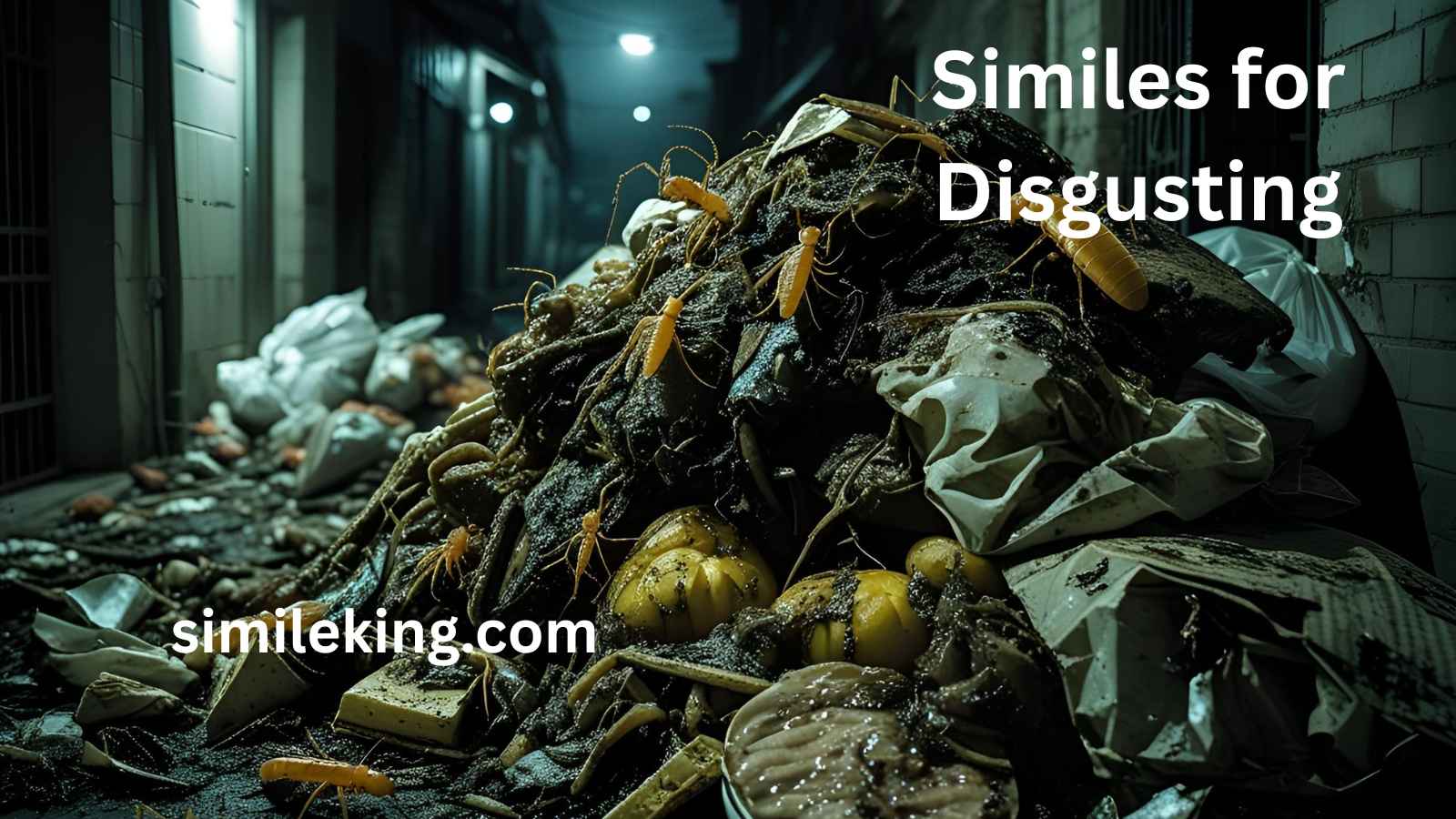Similes are a powerful tool in language, allowing us to draw vivid comparisons that evoke strong emotions and imagery. When it comes to describing something disgusting, similes can make the description more relatable, humorous, or impactful. This article will explore 20 similes for “disgusting,” provide examples of similes in poems for kids, and offer casual alternatives to the phrase. Additionally, we’ll delve into the nuances of tone and context, ensuring you have a variety of options for both formal and informal conversations.
What Are Similes?
A simile is a figure of speech that compares two different things using the words “like” or “as.” For example, “Her smile was as bright as the sun” is a simile that compares a smile to the sun, emphasizing its radiance. Similes are commonly used in literature, poetry, and everyday language to create vivid imagery and convey emotions effectively.
tions, to make your descriptions more vivid and engaging.
Examples of Similes in Poems for Kids
Similes are a fantastic way to introduce kids to the beauty of language and poetry. Here are some examples of similes in poems that are perfect for children:
- “The moon was like a silver coin in the sky.”
- This simile compares the moon to a shiny coin, making it easy for kids to visualize.
- “Her laughter was like a bubbling brook, cheerful and bright.”
- This simile evokes the sound and joy of laughter, comparing it to a flowing stream.
- “The clouds were as fluffy as cotton candy.”
- Kids can easily imagine soft, fluffy clouds resembling their favorite treat.
- “His temper was like a volcano, ready to erupt at any moment.”
- This simile helps kids understand the concept of anger through a vivid comparison.
- “The stars twinkled like tiny diamonds in the night sky.”
- This simile creates a magical image of stars sparkling like precious gems.
- “The wind howled like a lonely wolf in the forest.”
- This simile adds an element of drama and sound to the description of wind.
- “The snow was as white as a blank sheet of paper.”
- This simple simile helps kids visualize the purity and color of snow.
- “The flowers danced in the breeze like ballerinas on stage.”
- This simile brings movement and grace to the description of flowers.
- “The sun was as hot as a blazing fire.”
- Kids can relate to the intensity of heat through this comparison.
- “The ocean waves roared like a hungry lion.”
- This simile adds power and intensity to the description of waves.
Using similes in poems for kids not only makes the language more engaging but also helps them develop their creativity and understanding of figurative language.
Casual Alternatives to the Phrase “Disgusting”
Sometimes, using the word “disgusting” can feel too strong or repetitive. Here are some casual alternatives you can use in everyday conversations:
- Gross
- Example: “That sandwich looks gross.”
- Nasty
- Example: “The trash smells nasty.”
- Revolting
- Example: “The idea of eating snails is revolting.”
- Yucky
- Example: “This medicine tastes yucky.”
- Foul
- Example: “The odor from the fridge is foul.”
- Repulsive
- Example: “The sight of the dirty bathroom was repulsive.”
- Sickening
- Example: “The thought of eating raw meat is sickening.”
- Unpleasant
- Example: “The texture of the food was unpleasant.”
- Off-putting
- Example: “The smell of the room was off-putting.”
- Appalling
- Example: “The condition of the kitchen was appalling.”
- Horrid
- Example: “The taste of the soup was horrid.”
- Displeasing
- Example: “The appearance of the dish was displeasing.”
- Unappetizing
- Example: “The presentation of the meal was unappetizing.”
These alternatives allow you to express disgust in a more nuanced way, depending on the context and tone of the conversation.
13 Texting Examples for Expressing Disgust
Texting is a casual form of communication, and expressing disgust in texts often involves shorthand or emojis. Here are 13 user-friendly examples optimized for texting:
- “Ew, that’s so gross! 🤢”
- “Nope, that’s nasty. 🙅♂️”
- “OMG, that’s revolting! 😷”
- “Yuck, I can’t even. 🤮”
- “That’s foul, bro. 🚫”
- “Ugh, so sickening. 🤢”
- “No way, that’s appalling. 😳”
- “That’s horrid, I’m out. 🏃♀️”
- “Ew, that’s off-putting. 😬”
- “That’s so unappetizing. 🍴❌”
- “Gross alert! 🚨🤢”
- “That’s nasty AF. 😷”
- “Yucky vibes all around. 🤢👎”
These examples are concise, relatable, and perfect for texting conversations. They also incorporate emojis to add emotion and clarity.
Choosing the Right Alternative Based on Context
The way you express disgust depends on the context and tone of the situation. Here’s a quick guide to help you choose the best alternative:
- Formal Settings: Use words like “revolting,” “appalling,” or “unpleasant.”
- Example: “The conditions of the facility were appalling.”
- Casual Conversations: Opt for “gross,” “nasty,” or “yucky.”
- Example: “That movie was so gross!”
- Humorous Tone: Use exaggerated similes or playful language.
- Example: “That smell is like a dumpster on fire.”
- Texting: Keep it short and use emojis for added effect.
- Example: “Ew, nasty! 🤢”
Conclusion
Similes are a versatile and creative way to describe something disgusting, making your language more vivid and engaging. Whether you’re writing a poem, having a casual conversation, or texting a friend, there are countless ways to express disgust without relying on the same old phrases. By using similes, casual alternatives, and context-appropriate language, you can communicate more effectively and leave a lasting impression.
So the next time you encounter something disgusting, don’t just say it’s “disgusting”—get creative with your language and watch your words come to life!



